
TIRE’d of the Stigma – PTSD Recovery Expedition Day 21 – The Formula
To be straight up and to the point, everything we are doing today is the formula to our daily recovery routines, and are the tools we use each day to better help manage our lives and prevent our emotions from consuming us.
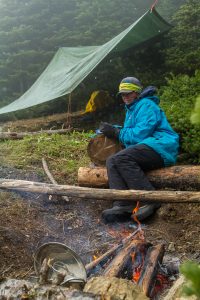
I feel silly saying this or trying to say it this way but here’s the “math” between the lines.
By flipping this tire and “thinking” positively, with the intention to help people who struggle with their health & well being, and by taking actions 8-15 hours a day with his thought process over time results with positive solutions.
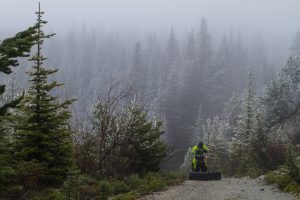
I just can’t sum it up any other way without writing an entire book ( another ) .
Again, it is through our thoughts ( positive thinking ) where lays the magic. Within our intentions is the equation over time without expectations equals results.

Nothing has changed in 5 years. Not one single day is any different than the next.
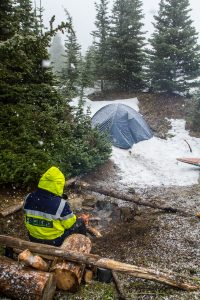
It is absolutely vital once we have found that “formula”, that works best for you to repeat every day especially when your feeling like you have control of your life and health again.
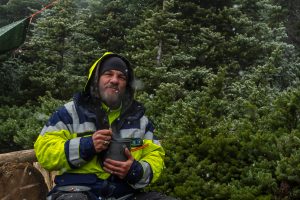
We can never walk away from the formula. That formula is going to be much different than anyone else’s formula.

The hard part is the work that goes into finding your formula and sticking to it.
Nothing is more important and nothing else matters!
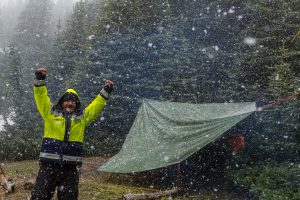
Once you’ve found the formula that works best for you, be careful because now you will want to share this with the world — and that’s why we are on this earth, to share our knowledge, experience and wisdom !
In time, when we are trying our best with positive intentions, you will see just what kind of energy, good people and wonderful things become attracted to your life like moths to a warm beautiful flame.
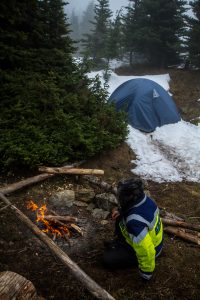
Example:
Clip from Let the Games Begin
Editor: David Newbie
Now it was time to keep my word. I was going to flip my 400-pound tractor tire the 30 kilometers from Seton Portage to Darcy in 30 days in memory of Nodar Kumaritashvili. I’d cross seven mountains wearing 60 pounds of solid steel chains. It would be called “Breaking the Chains BC.” Now that would raise some awareness!

See, when I’m going on my tire flipping thing, I get into my own world. I get my chains on, got my best lil’ bulldog buddy Meathead, and it’s meditative. I escape any other thought and everything other than just that moment. I can feel the rain. I can feel the wind. I can feel my muscles burning and my legs aching. You get into this rhythm: pushup, pushup, situp, flip, flip, flip. You do this for hours and hours and I loved it.
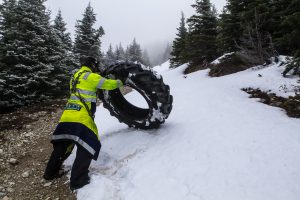
Once, somebody drove by and said, “What do you mean you’re out here raising awareness?
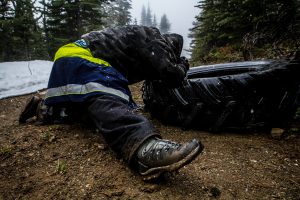
Ain’t nobody out here!” It dawned on me, you know, you’re right. We’re flipping this tire, but there’s nobody here to raise awareness to. But it didn’t bother me, because I’ll tell you who knew and who was watching.

The universe. Every animal in the forest could see us out there. Every needle on every tree, every bird that flew by. Every cougar, ever deer, every bobcat. Nature knew. Every star in the universe could see what we were doing. That’s all that mattered.
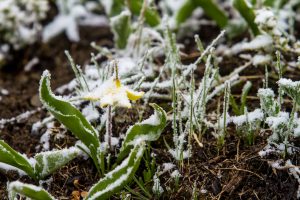
I set the goal, I said I was going to do it, and I did it. That’s all that mattered. We’d be out there a good sixteen hours a day sometimes, depending on the terrain.
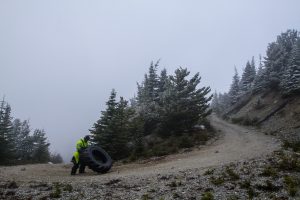
Each flip of that tire, I kept thinking that when we got to Whistler, there was going to be a marching band, the mayor was going to be there, the fire chief, police chief, Nodar’s family…. haha boy was I ever wrong.
At about kilometer 14 I got an email from somebody who asked me if I was aware of the suicide rate in first responders who’d been diagnosed with PTSD in Canada. They said the work that I was doing was so important because over 100 of those responders had died by suicide.

I read that fact and thought, are you fucking kidding me? Are you telling me that my attempted suicides weren’t just my bad luck? Other people were going through the same circus hoops that WorkSafe BC put me through—and killing themselves? I thought to myself, wait a minute—I really am not alone. I couldn’t believe it. Firefighters, police officers, paramedics, corrections officers and soldiers who risked their lives for their communities were killing themselves. I thought I had the grandiose excuse that I was a gangbanger and had troubles in my childhood. I had no idea. Keep in mind that at this time I still didn’t know anything about PTSD. All I knew was that I had been diagnosed a few times, never got help, and self-medicated. It was only the year before that I had gotten my life back and focused on getting the camp going because that was what worked for me. Never did I do research and get into the nuts and bolts. Something big was up here.

Yeah, I was angry. Because it made me sit there and think about my Angel and my stepson. How I never got to keep playing hockey. About all the people at work who stabbed me in the back. About how many times WCB made me jump through the wringer. About how many times I loaded my guns to go shoot the fucking cunts….
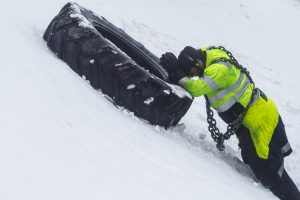
Sorry, sorry, sorry…. That’s unacceptable and I ask you to forgive me. But it’s not easy to put icing and sugar on such darkness.
Over 100 Canadian first responders have died by suicide in the past 2 years, and I can tell you why from experience.
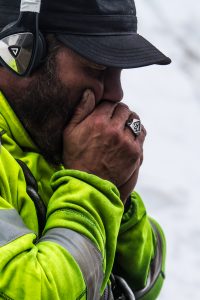
When you see what you see when risking your life, you take it all home with you and it is not easy to just unwind from. You can’t just take time off work. Most first responders do what we do because we want to give our lives to help people. We are the type of people with huge hearts. Sometimes we may have big egos, but that doesn’t matter. The bottom line is that we care so much that we are willing to risk it all to help the public.

But with that kind of personality, we will pretend to get tougher and tougher because we know that if we ever, even for a second say that our job gives us stress or nightmares, we will lose the reputation that we spent years and years training for, and maybe even our jobs. We will lose the reputation of being the hero: the guy who saved that kid’s life, the man who took a bullet, or the woman who cut the roof off a car to save a family.

We spend a lot of time practicing our jobs and we make sure to take all possible safety measures to protect ourselves while helping the public, but why on earth do we not ever practice for the aftermath? I spent 80 hours taking the OFA level 3 course and 11 months receiving firefighter training, in addition to working in 3 different first responder divisions. But never once did I hear about what to do in the aftermath of failing to save someone’s life. Not once did they teach us about Post-Traumatic Stress.
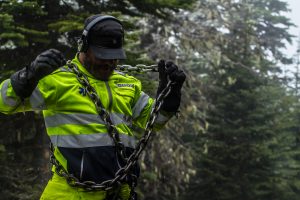
Ask any emergency service provider what you should think about first before even leaving the station or hall, and they will tell you it’s safety. Personal protection equipment and scene safety are the number one priority in any emergency. So why, in all of our training, are we never given any awareness of the psychological issues that will come from helping others?
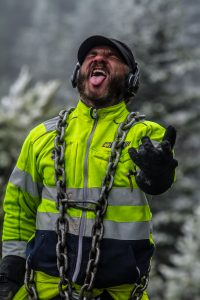
The textbooks I got didn’t talk about PTSD, but they talked about CIS—Critical Incident Stress. They stated clearly that we will come across a lot of trauma in our careers, but that we shouldn’t worry because there is a special team of people called the Critical Incident Stress Debrief Team who will come swooping in to help you right away after you deal with a tragedy.
My intention back in 2016, during Breaking the Chains, was to get “the people’s” attention and share my story in hopes for change to the system. Change the way we are educated and start focusing on the “prevention” side of things rather than always wait till we are broken or injured to try and fix us.
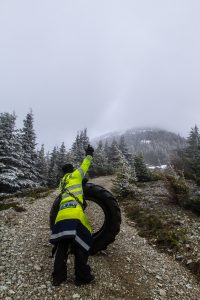
This makes absolutely no sense that the “Justice Institute of British Columbia”, along with St. Johns Ambulance have failed to give us the truth, knowledge and tools to prevent and manage our emotions long before the shit calls during our struggles therefore leaving us to fend for ourselves and worse of all to rot and die by suicide alone after many years of suffering in complete silence.
Totally unacceptable !
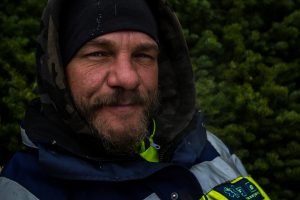
Thank you Surrey Firefighters Charitable Society & Surrey Honda for inspiring and motivating us on this years PTSD, Mental Health Recovery Expedition.
Your Friend, Our Voice
Terrance J. Kosikar Ph.D.
Photos: Jillian A Brown
Sponsors:
MEC
VSSL
The Rolling Barrage
Nesters Food Market
